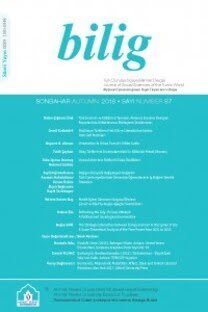Tursınhan Zakenoğlu’nun Mangitas (Bengütaş) Romanındaki “Mangilik El” (Ebedȋ Ülke) Kavramının Sanatsal Sunumu
Günümüzde sanatsal bilimsel edebiyat eleştirisi kategorisinin sanatsal eserlerde ele alınması, Kazak edebȋ eleştirisinde de önemli yere sahiptir. Kazak edebiyatında uzun süreli oluşma, gelişme ve canlanma tarihi olan “Ebedȋ Ülke” kavramı, ulusal sanat kavramlarının bir parçasıdır. Tarihsel, yazınsal ve bilimsel araştırmalara göre “Ebedȋ Ülke” kavramının etimolojisinin 6. – 8. yüzyıllardaki “Bilge Kağan”, “Tonyukuk”, “Kül Tegin” ve diğer Eski Türk yazıtları metinlerine, bazı eski kaynaklarda daha da önceki yüzyıllara dayandığı düşünülmektedir. Yazar Tursınhan Zakenoğlu’nun Bengütaş adlı romanında “Ebedȋ Ülke” kavramı üzerinde bir sanat birleşmesini yaratan bireysel yazma sistemleri, semboller, metaforlar, denklemler v.b. yöntemler çokça kullanılmıştır. Romanda yazarın sanatsal bakış açısına göre, “Ebedȋ Ülke” kavramı, “Yaradan’ın belirlediği Mahşer gününe kadar ulusun maddi ve manevi değerleri kendisine ait ve ebedȋ olmalıdır.” anlamına gelen geleneksel yaratıcı fikirler ile aynı anlama gelmektedir. İsmi geçen romandaki millȋ değerler, Türk halkının değerleri ve kahramanlarının betimlenmesi “Ebedȋ Ülke” kavramının tanıtımını oluşturur.
Anahtar Kelimeler:
“Ebedȋ Ülke”, Kazak romanı, Türklük kavramı, “Ebedȋ Ülke” kavramı, sanatsal sunum
Artistic Representation of The Concept “Eternal Nation” in the Novel “Mangitas” by Tursunkhan Zakenuly
Today, the process of considering the category of concepts in foreign cognitive literature in artistic works is also relevant and important in the literary studies of Kazakhstan. The concept “Eternal nation” is one of the national artistic concepts that have a long history of formation, development and modernization in the Kazakh literature. It is believed that the etymology of the concept “Eternal nation” in the historical and literary-cognitive researches has started in the texts of the ancient Turkic monuments such as “Bilge kagan”, “Tonykuk”, “Kul Tigin” and others that belong to the VI-VIII centuries, and according to some ancient sources it is thought to have begun in much more later epochs. The novel “Mangitas” (“Eternal Stone”) by writer Tursynkhan Zakenuly contains a system of individual authoring images, symbols, metaphors, equations, a lot of figurative devices and etc., which create an artistic association on the concept of “Eternal nation”. According to the artistic decision of the author in the novel, the concept of “Eternal nation” is explained with the help of the conditional and figurative thoughts that the material and spiritual heritage of the nation belong to the nation till the end of the universe set by the Creator and they should be eternal. The implementation of the national, Turkic values and figurative system of characters in this novel is a representation of the concept of “Eternal nation”.
Keywords:
“Eternal nation”, Kazakh novel, Turkic concept, concept of “Eternal nation”, artistic representation,
___
- Abdimanoğlu, Ömirhan vd. Ejelgi jäne xandıq däwir ädebïetinegi “Mäñgilik el” ïdeyası. Kazak Üniversitesi Yayınevi, 2016.
- Ahmetoğlu, Şadıman vd. “Köne däwirdegi ädebï eskertkişter.” Ädebï jädigerler, C. 20, Taimas Yayınevi, 2017.
- Askoldov, Sergey. Konsept i slovo. Academia Yayınevi, 1997.
- Auespayeva, Pakizat vd. Babalar Sözü. Yüz ciltte. C. 78, Foliant Yayınevi, 2011.
- Biyazdıkova, Aliya vd. Baht Kavramının Türk Algısındaki Görünüşü. Ulağat Yayınevi, 2018.
- Dospambetov, Uzakbay. Abılaydıñ aq twı. C. 2, Samara-Print Yayınevi, 2018.
- Karasik, Viktorıya vd. Bazovye harakteristiki lingvokulturnyh konseptov. C. 1, Paradigma Yayınevi, 2003.
- Nazarbayev, Nursultan. “Qazaqstan Jolı – 2050: Bir Maqsat, Bir Müdde, Bir Bolaşaq”. Egemen Kazakistan. 18 Ocak 2014.
- Nurdauletova, Bibiayşa. Kognïtïvtik lïngvïstïka. Almatı, 2011.
- Sartkocaoğlu, Karjaubay. “Moñğol” Degen Sözdiñ Özi Tw Basta “Mäñgilik El” Ïdeyasınan Şıqqan”. Jebe. 3 Ekim 2013.
- Stepanov, Yurii. Konstanty. Slovar’ russkoy kul’tury. Moskova, 1997.
- Temirbolat, Alua. Problema khronotopa v sovremennoy proze. Tsennıye Bumagi Yayınevi, 2003.
- Taşağıl, Ahmet. Tarïx – adam oyınıñ qazınası. C. 10, Foliant Yayınevi, 2006.
- Volodina, Nataliya. Kontsepty, universalii, stereotipy v sfere literaturovedeniya. Çerepovets Devlet Üniversitesi Yayınevi, 2010.
- Yesim, Ğarifolla. “Qazaq Fïlosofïyası”. Kazak Edebiyatı. 20 Haziran 2003.
- Zakenoğlu, Tursınhan. Mäñgitas. Dauir-Kitap Yayınevi, 2015.
- Zakenoğlu, Tursınhan. “Adebiportal.” http://adebiportal.kz/kz/news/view/2064. 10 Haziran 2015, 13 Aralık 2021.
- ISSN: 1301-0549
- Yayın Aralığı: Yılda 4 Sayı
- Başlangıç: 1996
- Yayıncı: Ahmet Yesevi Üniversitesi
Sayıdaki Diğer Makaleler
Dağlık Karabağ Krizi Çözümünde Arazi Takası Formülü: Goble Planı ve Lavrov Planı
Kazak Şecerelerinde Türk Algısı ve Ortak Ata
Seyfullah YILDIRIM, Mehmet TOPAY
Ordaly KONGYRATBAYEV, Saulebek RUSTEMOV, Bakytzhan ZHURSUNBAYEV, Seiilkhan TOKBOLAT
Muharrem TUNA, Başak ÖZYURT, Ayşe Selin DÜLGER, Fatih TÜRKMEN, Necmi UYANIK
Amerika’da Gönüllü Bir Osmanlı Elçisi General Lew Wallace
Selcen ÖZYURT ULUTAŞ, Gaye YAVUZCAN
Güney Azerbaycan Çocuk Edebiyatının Öncüsü: Samed Behrengi
Romanya’daki Türk-Tatar Toplumunun Matbuat Mirasından: Bora (Viscolul)
